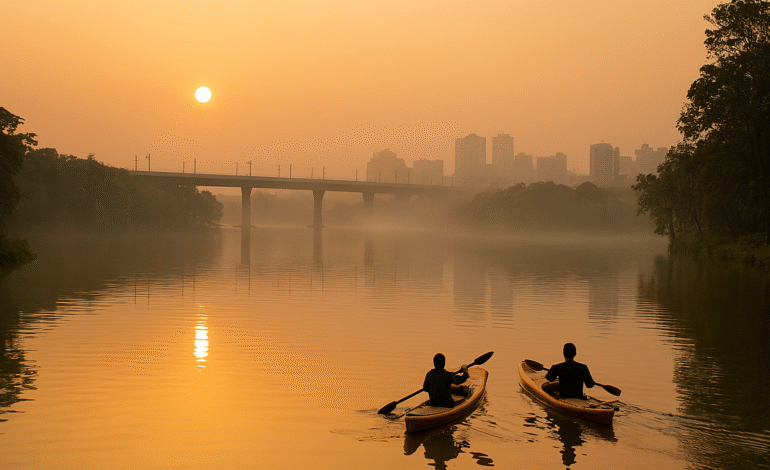Diabari Lake kayaking has emerged as a serene urban retreat in Dhaka, offering city dwellers a refreshing break from the constant hum of traffic and crowded streets. Tucked away at the fringes of Uttara, Dhaka, this quiet lake now attracts students, families, and those seeking a brief escape into nature.
Unlike distant weekend getaways, Diabari Lake kayaking allows people to enjoy a slice of calm within the city—drifting across still waters, surrounded by greenery, and letting the stress of daily life melt away.
Getting There & What to Expect
Located within a short walking distance from Uttara Center Metro Station, Diabari Lake is both accessible and unassuming. You don’t need to travel far or spend a fortune to enjoy the experience. The lake offers two-seater and three-seater kayaks, accommodating solo paddlers, couples, or small groups.
Kayaking is scheduled in the late afternoon when more visitors are around. The operators run the activity for a limited window—typically 2 to 3 hours in a day. Pricing is affordable: 100 taka per person for 30 minutes is standard. If you rent a kayak for two or three, the total fare is similarly scaled. There is also a rule that a solo paddler pays the rate for two, which the operators justify as necessary for economic viability.
Why Diabari Lake Kayaking Is Gaining Popularity
Proximity & Accessibility
One major appeal of Diabari Lake kayaking is that it brings nature into the urban fabric of Dhaka. For many, it’s the closest meaningful nature experience—they need not travel to distant lakes or rural areas on weekends.
Since the lake is near public transportation, it opens access for a wide range of Dhaka residents—students, workers, families—without dependence on private vehicles.
Affordable & Inclusive
Kayaking at Diabari Lake is priced to be inclusive. The low cost ensures that people from diverse socioeconomic backgrounds can participate. The site sees visitors “of all classes,” as quoted by the chief officer, who emphasizes the importance of open, quiet space in a dense capital.
Safety & Service
Safety and visitor trust are prioritized. The operation runs a 24/7 security presence and employs around 24 staff members, with added supervisors to ensure the facility’s smooth function.
The staff adhere to strict rules of conduct. One notable story: when a tourist dropped gold jewelry into the lake, a staff member (Hossain Ali) persisted in searching and managed to recover it after nearly two weeks—a gesture that greatly enhanced public trust.
The Atmosphere: Nature Meets Urban Edges
Stepping onto the water during Diabari Lake kayaking is akin to entering a different pace of reality. The surroundings are dominated by open sky, lush trees, and the gentle ripples of the lake. The distant rumble of urban life recedes.
Many visitors liken the scenery to rural landscapes—soft white flowers, expanses of greenery, and quiet reflections. In fact, some say the view mirrors scenes from Pather Panchali, the classic Bengali film.
Around the lake, amenities include children’s rides, food stalls, balloon shooting games, and birdlife. When evening arrives, the flocking of birds and settling dusk add to the peaceful ambiance.
Challenges & Future Potential
While Diabari Lake kayaking is flourishing, there are challenges to sustainability and growth.
Limited Timing & Capacity
Because the kayaking window is short, many visitors find queues or wait times during peak hours or holidays. Expanding operating hours and increasing boat capacity could help balance demand.
Environmental Conservation
Maintaining water quality, managing litter, and preserving the surrounding green buffer zones will be essential as interest grows. Without careful oversight, the serenity that draws people may be eroded.
Infrastructure & Promotion
Improved facilities—better pathways, shade, restrooms, lighting—and more promotion could attract tourists beyond Dhaka, making Diabari Lake kayaking a must-do destination for visitors.
Partnerships with city authorities, urban planners, and tourism bodies could help integrate the lake into broader city greening strategies.
For Visitors: Tips & Best Times
Visit in late afternoon to avoid midday heat and enjoy more comfortable paddling conditions.
Go on weekdays or non-peak times to avoid crowds and long wait times.
Wear light, quick-dry clothes and bring water, sunglasses, or a hat.
Keep electronic valuables safe—cases or dry bags help.
Respect rules (no misbehavior), and be considerate of fellow visitors.
Arrive via metro if possible to avoid traffic and parking hassles.
Broader Implications: Urban Wellness & Green Spaces
The success of Diabari Lake kayaking reflects a growing need in cities like Dhaka: nature-based escapes within urban reach. As densification continues, preserving and activating such pockets of calm becomes vital for public mental health, community connection, and ecological balance.
This trend echoes in many global cities where everyday escapes—urban lakes, riverfronts, pocket parks—become lifelines for stressed citizens.
Diabari Lake kayaking is more than a recreational activity. It’s an urban oasis where Dhaka’s busy residents can paddle, breathe, and reconnect with nature. In the heart of one of the world’s densest cities, the lake offers a rare balance: proximity, peace, affordability, and natural beauty.
As demand grows, thoughtful planning and stewardship are crucial. With careful development, Diabari Lake kayaking can evolve into a signature urban nature experience — reminding Dhaka that amid concrete and chaos, quiet waters and green calm can still thrive.








